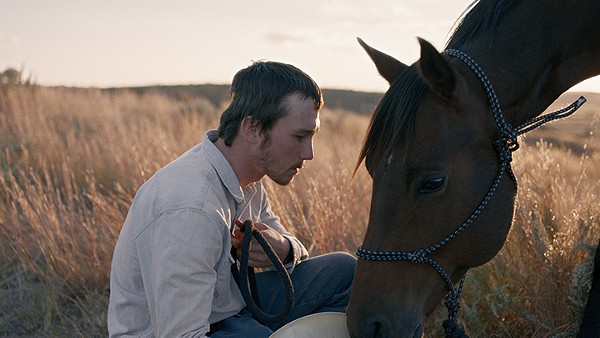The Rider
The Rider, 2017, 3 stars
The Rider redefines docudrama
From The Orlando Weekly, May 31, 2018
How often have you heard someone say, “It’s a genre film”? For some, that phrase is code for horror, science fiction or extreme action, or a movie that allows directors to prove they have mastered the tropes of those genres. For others, it’s a justification for excessive violence, lazy writing or narrative silliness.
Intellectually, the phrase makes little sense, as most films can be sorted into a category. Further, it’s often insulting to well-made thrillers and sci-fi flicks that deserve a place alongside mainstream dramas and comedies rather than being relegated to secondary cinematic status.
The Rider, a new indie by Chinese writer-director-producer Chloé Zhao, challenges our assumption that all films can be labeled. Though her second feature (after 2015’s Songs My Brother Taught Me) has the pace and theme of a Western, it could more accurately be called a drama thanks to its story. But because it eschews experienced actors and instead uses the real people who inspired the plot, it becomes more documentary than narrative fiction. Welcome to the deconstruction of genre cinema.
This may seem like something new thanks to Clint Eastwood’s The 15:17 to Paris, Bart Layton’s American Animals and other recent films that blur the line between doc and fiction. But the cross-breeding of truth and make-believe can be traced back to the dawn of cinema in 1895 when Auguste and Louis Lumière filmed non-actors playing themselves but gave them what we would today consider direction. The same was true for Nanook of the North, which, in 1922, was labeled the first documentary feature but actually has more in common with The Rider, as both films feature people playing slightly altered versions of themselves.
Zhao’s film concerns Brady, a horse trainer and bronco rider recovering from a severe head trauma. Living in the badlands of South Dakota, he has known little except the rodeo. Faced with the prospect of permanent paralysis or worse if he is injured again, he must either risk his health or find a new direction.
“There’s nothing like strapping yourself onto a 2,000-pound animal and just going with it,” his friend Lane says. “That’s what I wanted to do, and I knew I wanted to do it for the rest of my life. I couldn’t imagine doing anything else.”
Trouble is, Lane’s bull-riding days are over after an accident left him paralyzed and unable to speak. Lane’s tragedy is not lost on Brady, who knows he could easily face the same fate. And the story carries immense emotional weight for us too, as Zhao cast the real Lane Scott. Through the accident that left him paralyzed actually happened in a car, not on a bull as the film suggests, the authenticity adds to the emotion, especially once you realize that everyone else – including Brady, his father and sister – are essentially themselves too, just with different last names.
Though Brady Jandreau is memorable as the adaptation of himself, other performances seem clunky, which isn’t a surprise considering the lack of acting experience. To achieve almost absolute authenticity, Zhao has sacrificed some performance and pacing. Still, that slow, meandering structure does complement the story, allowing us to mostly overlook the movie’s misplaced minimalism, narrative simplicity and overuse of handheld camera.
The film avoids editorializing, never once wading into a discussion of animal rights or questioning whether this lifestyle is worthy of reverence. But there’s little doubt that Brady views his horses as extensions of his family and cares for them like he cares for his sister, Lilly, who has Asperger’s and delivers a performance (as herself) that is simultaneously awkward, uncomfortable and astonishing. Indeed, instead of lecturing us or passing judgment, The Rider is content to amble, focusing its lens on the people, dialects and culture of an American West that is both changing and changeless. And though the film’s first half might bore you, the second might just hit you in the gut.
In one of the movie’s most emotional moments, Brady must decide the fate of a beloved, badly injured horse. Not able to dispatch the animal himself, Brady trusts his dad with the kill. Turning the gun on the animal but realizing that the deed will be easier if the horse is distracted, his dad tells his son, stoically, “Whistle for him when you walk away.”
For both horse and cowboy, may the end come that nobly.
© 2018 Orlando Weekly / MeierMovies, LLC
